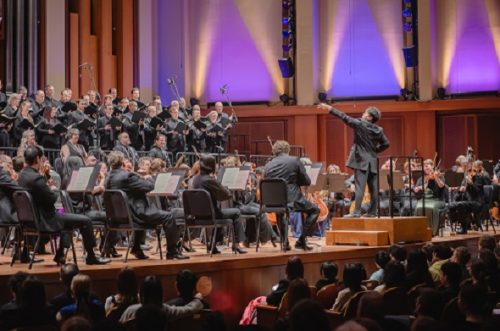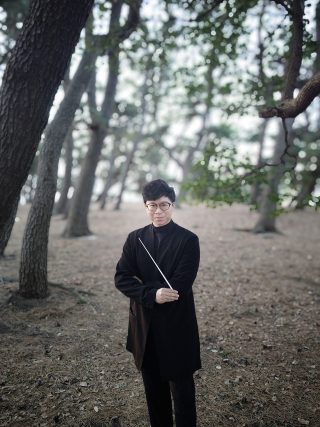Zach Carstensen profiles conductor Kahchun Wong
Anticipation crackles within the air, thick like summer time lightning earlier than the storm breaks. A hush descends, settling over an expectant viewers. Each cough or rustling program appears like a desecration. On the podium, conductor Kahchun Wong stands on the fringe of creation – shoulders squared, again straight, baton held aloft. A second’s pause, pregnant with chance, his hand dips, sluggish and deliberate, tracing the primary stroke of a masterpiece: Beethoven’s Symphony No.9.
For sixty minutes, Beethoven’s motifs ebb and stream, a wrestle between gentle and shadow, order and chaos. Wong, a captain on the helm, guides the orchestra by means of the tempestuous waves, his each gesture framing the music’s path: pleasure, anguish, defiance, triumph.
By the top, Wong has succeeded in taking the viewers in Benaroya Corridor on a journey they’d not quickly overlook. Wong performed 4 performances from 28-31 December. Most years, Seattle’s conventional end-of-December performances of Beethoven’s Ninth are an afterthought for devoted concertgoers. They’re dependable income mills – and who doesn’t like a little bit uplift and chance in Beethoven’s Magnum Opus (or one among them) to ring within the New Yr?
This season, Wong’s performances had been occasions. Every time, he created Beethoven’s universe anew, serving to an viewers discover a message between the notes of a transcendent symphony that also appears pioneering even within the twenty-first century. Not solely is Wong one of many hottest names in classical music however, as critic Thomas Could famous in a evaluate, the performances had been significantly memorable, with robust phrasing, dynamic management and Wong’s charismatic podium presence.
For Wong, the problem with Beethoven’s Ninth is making certain that the work’s first three actions – its orchestral actions – should not an afterthought for the viewers. ‘My problem each time I play this work is tips on how to put the primary three actions into context, as a result of they’re all so robust’.
He continued: ‘You have got the third motion, which to me is essentially the most stunning sluggish motion by Beethoven throughout his whole output. However it’s at all times overshadowed as a result of everybody who’s going to a Beethoven Ninth efficiency would stay up for the finale’.
Within the final two years, as Wong’s star has risen, he has emerged as a dependable accomplice for the Seattle Symphony. A Singaporean by beginning, his profession took off when he received the Mahler Competitors in 2016. Wong debuted with the orchestra in 2022 for its annual Have a good time Asia live performance, and returned in 2022 for a program that includes Mussorgsky’s Photos at an Exhibition. For the 2023-2024 season, Wong is again for 2 imposing masterpieces: the now-past performances of Beethoven’s Ninth, and April 2024 live shows of Mahler’s Third Symphony.
Performing with the Seattle Symphony is a welcome expertise for the younger conductor. ‘It’s fairly a chill place’, he famous. The Pacific Northwest’s relaxed tradition contrasts with different locations he has performed. Whereas Wong finds there’s extra bridge constructing to be executed elsewhere as a youthful Asian conductor, that is much less the case in Seattle. ‘The individuals right here backstage and on stage remind me numerous my interactions in Japan and in Asia. There’s an openness of working, and in addition a really robust sense of mutual respect for one another’.
Outdoors of Seattle, Wong’s consideration is targeted on a trio of famend orchestras: Hallé Orchestra, Dresden Philharmonic and Japan Philharmonic. The Hallé catapulted Wong into the higher echelon of conductors final 12 months when it introduced he would succeed Sir Mark Elder beginning with the 2024-2025 season. Wong takes over an English custom steeped in Elgar, Vaughan-Williams and Mahler, in addition to a wealthy recording custom that began with John Barbirolli and has continued lately with lauded albums on the orchestra’s personal label.
His plans for every of the orchestras are nonetheless in formation. In Dresden, the place he serves as Principal Visitor Conductor, Wong hopes to proceed to develop the orchestra’s artistry past its conventional Germanic roots. ‘It has a really particular custom. It’s a little bit bit like Vienna, the musicians all play in a sure sort of manner, Within the orchestra you might need a second era or a 3rd era musician who could have studied with a primary or earlier era trainer who used to play in that orchestra. So there’s a very conventional passing down of that Dresden sound’.
Wong debuted in his new function final 12 months by pairing Additionally Sprach Zarathustra with Thai composer Narong Prangcharoen’s Reflection of Shadow. ‘My job is how can we contextualize Strauss’. In February, Wong will conduct Mahler’s Symphony No.1 together with Sinfonia Tapkaara, a piece by Akira Ifukube. ‘It’s fully symphonic, so there is no such thing as a soloist. It’s a really robust work by Ifukube, who’s well-known for his music for Godzilla’.
The Japan Philharmonic, the place Wong is Chief Conductor, presents totally different challenges. A wealthy, established musical tradition in Japan makes it potential for musicians, conductors and composers to pursue their careers solely in Asia. ‘Japan has a wealthy classical music tradition, which is sort of unknown to the remainder of the world, as many issues in Japan are’.
Serving to the remainder of the world respect Japanese musical tradition will take time. Wong’s willingness to juxtapose East and West will assist in the quick time period, however over the longer course of his profession, he hopes to assist set up the reputations of extra Asian composers. ‘My dream could be that in some unspecified time in the future there could be a sort of composer’s institute and help of recent works, symphonic works particularly, for my area, for Southeast Asia, for higher Asia’.

When Wong returns to the Seattle Symphony in April, he’ll carry with him a well-known piece. Wong received the esteemed Mahler Competitors in 2016 partly due to his mastery of the Third Symphony. In a brief video from the competitors, he seems captivated by the music he’s shaping together with his gestures. ‘The Third Symphony to me is definitely a most stunning narrative, and it’s one which I establish with very simply’, he mentioned.
Like Beethoven’s Ninth, Mahler’s Third is uncommon – even for a composer like Mahler, who was at all times striving for extra in his compositions. In an often-repeated quote, the composer mentioned {that a} symphony ‘have to be just like the world. It should include all the pieces’, and the Symphony No.3 comes closest to reaching this. It’s Mahler’s longest symphony: a efficiency usually lasts ninety minutes. It is usually his solely symphony with an express program. As Wong mentioned, ‘I imply, within the West you’d speak concerning the first day of creation, God created one thing, second day, third day, fourth day, and it’s a little bit bit just like that’.
Mahler divides the composition into two elements and 6 actions, delineating the development of existence and human comprehension. The preliminary actions set up a reference to the pure world, whereas the concluding three actions – ‘What man tells me’, ‘What the angels inform me’, ‘What heaven tells me’ – delve deeply into the human situation. The sixth motion, a purely instrumental piece, stands as a possible apex in Mahler’s orchestral repertoire. ‘It’s transcendental, it’s not even about whether or not that is the Western God or the Hindu God or the Taoist God. It may be something, it transcends, it’s mainly transcendence and one other twenty-five, thirty minutes of pure magnificence’, added Wong.
All of Mahler’s symphonies embody philosophical qualities: the composer tried to make sense of the world and his mortality by means of music. Different symphonies is likely to be extra exultant, riper with pathos, however none seize life – from the pure world to the human – as successfully.
As Wong embarks on new inventive ventures, carrying with him the torch of each Western and Jap musical traditions, one factor is definite: his path is one audiences and music-lovers will proceed to look at with rapt consideration, every gesture of his baton promising a future as thrilling and transformative because the music he instructions from the rostrum at this time.
His baton isn’t just a conductor’s software, it’s a bridge, one which connects the legacy of Beethoven to the spirit of Narong Prangcharoen, for instance. His gestures are a dialogue between Mahler’s hovering symphonies and the fragile brushstrokes of Japanese ink work. Wong’s journey is greater than only a conductor’s profession: it’s a cultural revolution within the making. He’s a pioneer, a pathfinder, a maestro of understanding. And as his baton dances by means of the air, we all know one factor for sure: the way forward for music is vivid.
Zach Carstensen

